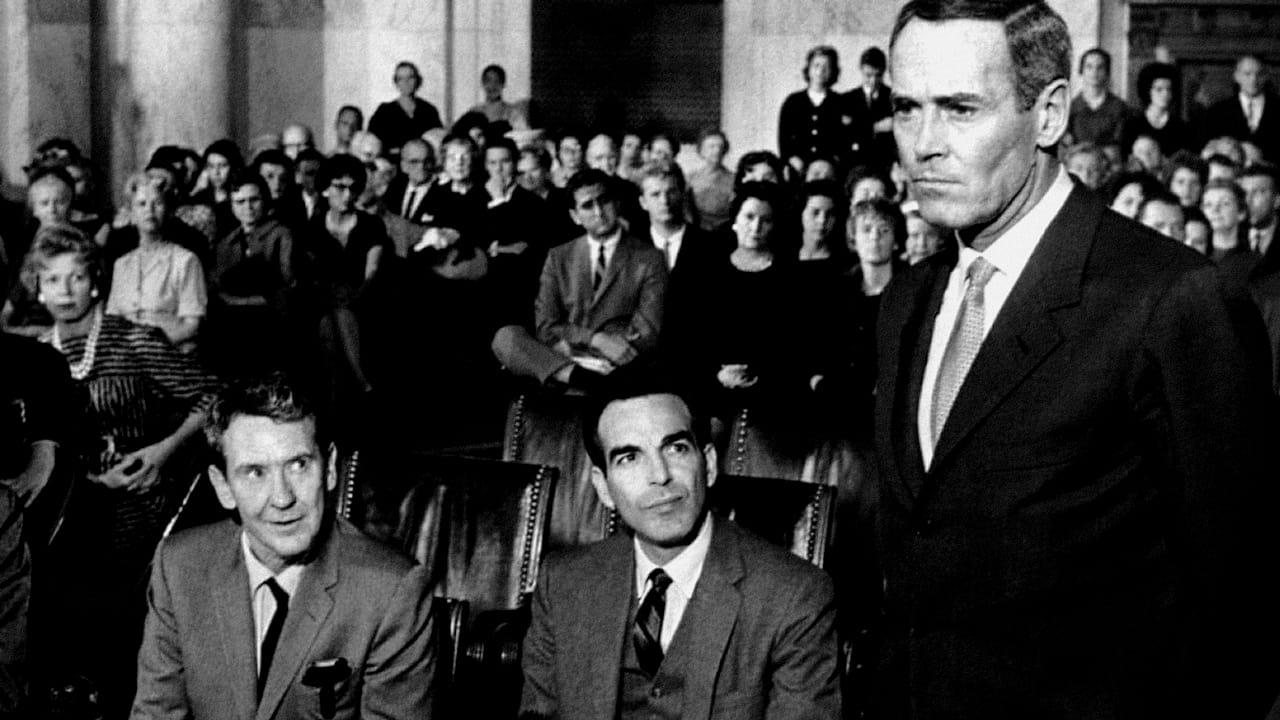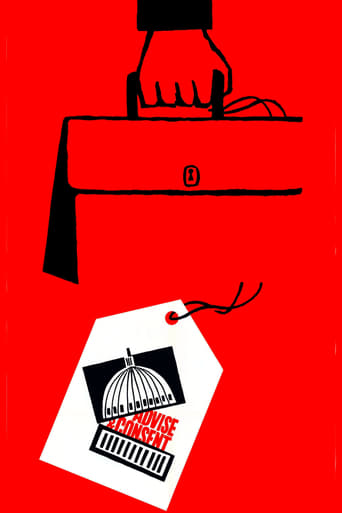CommentsXp
Best movie ever!
Livestonth
I am only giving this movie a 1 for the great cast, though I can't imagine what any of them were thinking. This movie was horrible
Hayleigh Joseph
This is ultimately a movie about the very bad things that can happen when we don't address our unease, when we just try to brush it off, whether that's to fit in or to preserve our self-image.
Skyler
Great movie. Not sure what people expected but I found it highly entertaining.
HotToastyRag
In case you don't know, when a President recommends a candidate for his cabinet, the candidate has to endure a grueling vetting process by a Senate committee. Then the Senate votes to approve him or her, and if approved, the Senate moves to "advise and consent" the candidate. With that knowledge, you'll be correct if you assume the film Advise and Consent is about a Senate investigation committee's interview with a candidate for Secretary of State. As usual, Otto Preminger has created an enormously edgy film. His work includes The Man with the Golden Arm, Hurry Sundown, and Anatomy of a Murder, and in all his films, he pushes the boundaries of what was allowed to be shown on the screen. He has a talent for bringing out the very best in his actors, and as usual, you can recognize his style by the opening credits.In Advise and Consent, Franchot Tone plays the President of the United States. I've always seen a superior air around him, so it seemed completely natural for him to be in such a position of power. Franchot, Walter Pidgeon, Charles Laughton, and Don Murray all acted like veteran politicians, well-versed in the backroom deals. None of them seemed like they were reciting lines; they were all living and breathing their parts. Walter Pidgeon is the lead-even though Henry Fonda gets first billing-and is the glue between those in the Senate. Charles Laughton is the suspicious Southern opposition leader, and even if you don't agree with what he's saying, you can appreciate his cunningness. Believe it or not, even though Henry Fonda is the candidate, he's hardly in the movie! Since I don't really happen to like him, I didn't mind his small role. Ironically, watching this movie feels like you're watching a Senate hearing in modern times, even though it's fifty-five years old! Not much has changed in the political world. There are tons of twists and turns in the script, so even though the running time is a little long, it's extremely entertaining.
talula1060
My only real criticism is Charles Laughton's performance. I realize I'm in the minority here, maybe even alone in this. See, I've enjoyed watching Laughton's performances since his early films if the 30s. He always energized every picture he appeared in. That's why I was so disappointed to see how I'll he had clearly become by this point. How acting is plodding and slow. I found myself frustrated whenever he started speaking. His accent was in and out and even when it was in, it was horribly done. I understand this was about 6 months before the cancer claimed his life. He just looks unhealthy which makes me sad and him hard to watch. I feel we could've done with an actor who was up to the task of this type of role. I don't feel Charles Laughton really was.
funkyfry
Taking on the world of Washington with the same ponderous and sober eye that he focused on jurisprudence in "Anatomy of a Murder", Preminger has styled a political drama that never seems false and never bores but also never really surprises or inspires.Half the fun is in trying to identify the real historical figures who provide the basis for the fiction. Offhand, I felt that Franchot Tone's President was similar to FDR, especially in how the situation develops with his nervous and self-doubting VP, played by Lew Ayres. Following that thread of thought, there seems to be a bit of Henry Wallace in Henry Fonda's Leffingwell, the nominee for Secretary of State. The film's main plot concerns the battle for Leffingwell's nomination, which eventually involves sordid blackmail regarding past homosexual affairs on the part of the junior Congressman from Utah (Don Murray). The anchor performances in the film come from Walter Pidgeon and Charles Laughton, who play a couple of grizzled Senate veterans locked in a sometimes subtle battle over the confirmation.All the performances are solid, even Gene Tierney's (sorry for the backhand compliment, Gene, but you deserve it..... what did Preminger have for her anyway?). She stands in for Mrs./Ms. Merriwether Post, even inhabiting her old house uptown. Peter Lawford is also surprisingly good as (this time not surprisingly) a thinly veiled John Kennedy stand-in (in his introductory scene, we observe a fashionably dressed blonde exiting his hotel room). There's a brief scene where Betty White plays a Senator from Kansas, which is a real treat for today's audiences.The film has a minimum of patriotic mumbo-jumbo, and for that we can be thankful.... Preminger does not fall into the classic Capra trap of condemning what he loves the most, and giving us a worshipful paean to a corrupt system after having shown us all the warts. But he does portray the gay blackmail angle in a way that's unfortunately homophobic, even if we try to give the film some slack for the change in the times. Why was Ray's (John Granger) friend depicted as such a slovenly pimp? Why was the gay bar depicted in such a seedy and shadowy manner (the boys at the bar lasciviously staring at Murray as he enters)? Why, oh why, did Murray have to push Granger into a gutter at the end of his scene? I understand that Murray was portraying some kind of self-loathing Mormon who had lapsed into homosexuality, but that was all the film gave us of Granger and it left plenty of space for the homophobes in the audience to walk out cheerful about seeing a queer having his face pushed in the mud.All in all, though, I liked the film. It's a bit dated... if you disagree with me, think about how different this film would be if it had been produced after Watergate and Vietnam. The film practically glows with its respect for the crusty old Senators played by Pidgeon and Laughton, reserving all its dire condemnation for the young upstart Senator played by George Grizzard with his "brain trust" -- the whiff of misplaced nostalgia is hard to avoid. Still, it is a diverting film full of excellent performances (including Grizzard's), so it is well worth watching at least once considering how few intelligent films have been produced dealing with our sordid national politics.
audiemurph
"Advise and Consent" is a strong entry in the canon of Preminger movies. The whole first half is particularly captivating, focusing on the complex relationships between the leaders of the Senate and the President, who would like to get his progressive friend Robert Leffingwell confirmed by the Senate for Secretary of State. The major strength of the movie is the incredible line-up of acting superstars, none of whom is allowed to shine above the rest, yet all of whom give quite powerful performances.Walter Pidgeon is magesterial as the Majority Leader who knows everyone, and, as a good friend and supporter of the President, is responsible for bringing the votes together for the nominee. Lew Ayres is elegant and wonderfully dignified as the Vice-President who is mostly ignored by everyone with power, yet remains genial throughout. Henry Fonda plays his relatively small role with conviction, and Peter Lawford is very appealing as a Senator who, naturally enough for Lawford, is a womanizer, but with a kind heart and an independent streak.Spectacular and demanding is Charles Laughton as the Southern Senator whose role is to fight against everyone. Looking almost ghostly in his white suit, Laughton brilliantly defends old-fashioned American values against the forces of progressivism and Communism. Franchot Tone does a convincing job playing a political fighter of a President who also happens to be dieing; he really does look quite like he is dieing.But stealing the whole movie, I think, is the great Burgess Meredith. Initially brought in to the Committee Hearing to denounce Henry Fonda as a Communist, Meredith starts off cocky. But his brilliance as an actor comes out in the amazing second scene with Fonda, who tears down Meredith while lieing about Meredith's past. Meredith knows Fonda is lieing, yet a combination of weak character and mental illness prevents him from defending himself, and he ends the scene completely disheartened, demoralized, and destroyed. Watching Meredith's facade of strength collapse is priceless. This is easily the best scene in the movie.The second half, focusing on the slow mental breakdown of the Senator from Utah, played by Don Murray, is a bit of a letdown, and frankly slows the movie down a lot. But it all leads to an incredible dramatic finish in the Senate Chambers; the last 5 minutes are definitely worth waiting for. It is not quite as astonishing as the last moments of "Mr Smith Goes to Washington", but it is powerful none the less. And the final moments of reemerging friendship, respect and humility between Walter Pidgeon and Charles Laughton are delicious and pleasing, and will leave you feeling quite satisfied.

